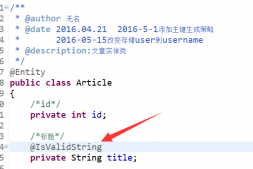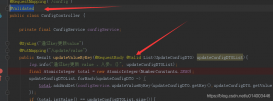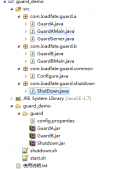一、java8 stream 操作
List<Map<String, Object>> maps 转 Map<String, Object>的两种方法
第一种,实用于数据查询返回的是List<Map<String, Object>> maps
方法一、
|
1
2
3
4
|
Map<String, Object>; resultMap = lists .stream() .flatMap(map ->map.entrySet().stream()) .collect(Collectors.toMap(e ->e.getKey(), e->e.getValue(),(a,b)->a))); |
方法二、
|
1
2
3
4
|
Map<String, Object> map = maps.stream() .map(Map::entrySet) .flatMap(Set::stream) .collect(Collectors.toMap(Map.Entry::getKey, Map.Entry::getValue,(a,b)->a))); |
注意!这种转换方法后面的(a,b)->a这个是必须的,因为list转map可能会出现key值重复的情况,如果不指定去重规则,转换的时候是会报错的
第二种,实用于数据查询返回的是List maps
|
1
2
3
|
Map<String, Object>; resultMap = lists .stream() .collect(Collectors.toMap(Entry::getProtity, Entry::getProtity,(a,b)->a))); |
这种实体类list就比较容易,在这个过程中还可以进行条件过滤,filter 或者排序 reversed,用到时加进去就可以,这里就不赘述了
补充知识:java8 统计字符串字母个数的几种方法(有你没见到过的)
1.统计字符串字母个数(并且保持字母顺序)
比如: aabbbbbbbba喔喔bcab cdabc deaaa
目前我做知道的有5种方式,如果你还有更好的,欢迎赐教
要求:统计字符串的字符个数,最好按顺序输出每个字符的个数
|
1
2
3
4
5
6
7
8
9
10
11
12
13
14
15
16
17
18
19
20
21
22
23
24
25
26
27
28
29
30
31
32
33
34
35
36
37
38
39
40
41
42
43
44
45
46
47
48
49
50
51
52
53
54
55
56
57
58
59
60
61
62
63
64
65
66
67
68
69
70
71
72
73
74
75
76
77
78
79
80
81
82
83
84
85
86
87
88
89
90
91
92
93
94
|
//方式1 public static void letterCount1(String s) { s=s.replaceAll(" +", ""); //1,转换成字符数组 char c[]=s.toCharArray(); Map<Character, Integer> tree=new TreeMap<Character, Integer>(); for (int i = 0; i < c.length; i++) { //第一次:a,1 //第二次:a,2 //2,获取键所对应的值 Integer value=tree.get(c[i]); //3,存储判断 tree.put(c[i], value==null? 1:value+1); } System.out.println(tree); } //方式2 使用流 //这个在测试特殊字符,比如\ \n时,他的顺序会不对,这个是Map造成的 //解决办法使用TreeMap public static void letterCount2(String s) { s=s.replaceAll(" +", ""); TreeMap<String, Long> result = Arrays.stream(s.split("")) .sorted()// .collect(Collectors.groupingBy(Function.identity(),Collectors.counting())); .collect(Collectors.groupingBy(Function.identity(),TreeMap::new,Collectors.counting())); System.out.println(result); } //或者 public static void letterCount2_1(String s) throws Exception { s=s.replaceAll(" +", ""); Stream<String> words = Arrays.stream(s.split("")); Map<String, Integer> wordsCount = words.collect(Collectors.toMap(k -> k, v -> 1, (i, j) -> i + j)); System.out.println(wordsCount); } //方式3 使用Collections.frequency //其实就是字符串变成集合存每个字串,把每个字串循环跟集合比较 public static void letterCount3(String s) { s=s.replaceAll(" +", ""); List<String> list=Arrays.asList(s.split("")); Map<String,Integer> map=new TreeMap<String, Integer>(); for (String str : list) { map.put(str, Collections.frequency(list, str)); } System.out.println(map); } //方式4 public static void letterCount4(String s) { s=s.replaceAll(" +", ""); String[] strs = s.split(""); Map<String,Integer> map=new TreeMap<String, Integer>(); for (String str : strs) { map.put(str, stringCount(s, str)); } System.out.println(map); } //方式5 public static void letterCount5(String s) { s=s.replaceAll(" +", ""); String[] strs = s.split(""); Map<String,Integer> map=new TreeMap<String, Integer>(); for (String str : strs) { map.put(str, stringCount2(s, str)); } System.out.println(map); } //巧用split public static int stringCount(String maxstr, String substr) { // 注意 // 1.比如qqqq,没有找到,则直接返回这个字符串 // 2.比如qqqjava,末尾没有其他字符,这时也不会分割,所以可以添加一个空格 // 3.java11开头没有字符,没有关系,自动空填充 // 4.对于特殊字符,要注意使用转义符 int count = (maxstr + " ").split(substr).length - 1; // System.out.println("\"" + minstr + "\"" + "字符串出现次数:" + count); return count; } //如果要不区分大小写,则compile(minstr,CASE_INSENSITIVE) public static int stringCount2(String maxstr, String substr) { int count = 0; Matcher m = Pattern.compile(substr).matcher(maxstr); while (m.find()) { count++; } return count; } |
2.统计字符串的单词个数
这个其实跟上面一样的,下面只写一个简洁的方法
|
1
2
3
4
5
6
7
|
public static void wordStringCount(String s) { //这里开始是字符串,分割后变成字符串流 Map<String, Long> result = Arrays.stream(s.split("\\s+")) .map(word -> word.replaceAll("[^a-zA-Z]", "")) .collect(Collectors.groupingBy(Function.identity(),Collectors.counting())); System.out.println(result); } |
3.统计文本单词个数
|
1
2
3
4
5
6
7
8
9
10
11
12
13
14
15
16
17
18
19
20
21
22
23
24
25
26
27
|
//统计一个文本中单词的个数 public static void wordFileCount(String path) throws IOException{ //这里一开始字符串流 //先分割 //在变成字符流 //在筛选 Map<String, Long> result = Files.lines(Paths.get(path),Charset.defaultCharset()) .parallel() //字符串流--分割--字符串流 .flatMap(str->Arrays.stream(str.split(" +"))) .map(word -> word.replaceAll("[^a-zA-Z]", "")) //去掉空 .filter(word->word.length()>0) .collect(Collectors.groupingBy(Function.identity(),Collectors.counting())); System.out.println(result); }//优化:更精确的是根据非单词来分组 public static void wordFileCount0(String path) throws IOException{ Map<String, Long> result = Files.lines(Paths.get(path),Charset.defaultCharset()) .parallel() //字符串流--分割--字符串流 .flatMap(str->Arrays.stream(str.split("[^a-zA-Z]+"))) //去掉\n .filter(word->word.length()>0) .collect(Collectors.groupingBy(Function.identity(),Collectors.counting())); System.out.println(result); } |
以上这篇java8 streamList转换使用详解就是小编分享给大家的全部内容了,希望能给大家一个参考,也希望大家多多支持服务器之家。
原文链接:https://blog.csdn.net/lyy19931025/article/details/108010464

















